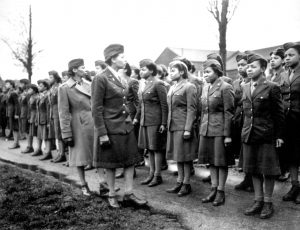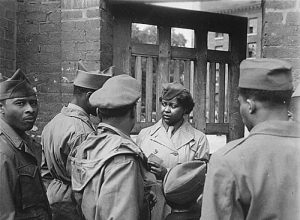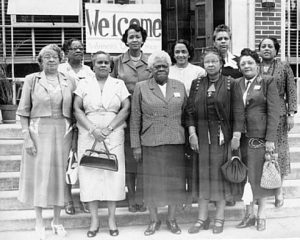“Somewhere in England, Maj. Charity Adams Earley and Capt. Abbie N. Campbell inspect the first African-American members of the Women’s Army Corps assigned to overseas service” Photograph (February 1945).

African-American women were generally seen as the breadwinners in the home during World War II. They occupied many political spaces, including the government and political parties, as well as functioning members of the actual war. Though a lot of Black women worked in domestic service industries, they also served important roles in the military and navy. An army unit named “Six Triple Eight”, or the 6888 Central Postal Directory Battalion, was the largest group of black women to serve overseas. From 1945-46, women of the battalion cleared a two-year backlog of mail for Americans in Europe between the Army, Navy, Air Force, and the Red Cross (Clark 2019).
“Black soldier visit an open house hosted by the 6888th Central Postal Directory shortly after their arrival in Europe in 1945”, Photograph, National Archives (1945)

During the 1940’s, the NCNW was involved in campaigning against segregation in the army and lobbied for black women’s rights in the U.S. Army. In 1942, Black women were accepted into the Women’s Army Corps (WAC) for the postal battalion. Black women who joined the WAC were often assigned least skilled work, that involved menial labor. Women such as Mary Green, Anna Morrison, Johnnie Murphy and Alice Young went on strike after being denied proper training, treatment and decency in the army, and legally fought against Army Corps, only to be discharged honorably in the end. This event would be known at the Fort Devens Strike of March 4th, 1945.
“Officers of the National Council of Negro Women. Founder Mary McLeod Bethune is center.” Photograph (1938)

The National Council of Negro Women (NCNW) was established by Mary McLeod Bethune in December of 1935, with the help of 28 other Black women organizations. The organizations focus was gathering information, creating networks and funding/sponsoring educational initiatives. In 1938, the NCNW held a conference in the White House for “Governmental cooperation in the approach to the problems of negro women and children”. This paved a way for Black women politicians to enter the White House and hold governmental positions, like Ms. Bethune herself. In the newspaper article from 1940, the secretary at the time, Carita V. Roan, is asking for women’s organizations to send her annual reports, as well as suggesting that they stay in contact with their elected officials. This article is a good example of the networking the national organization engaged in and organized
